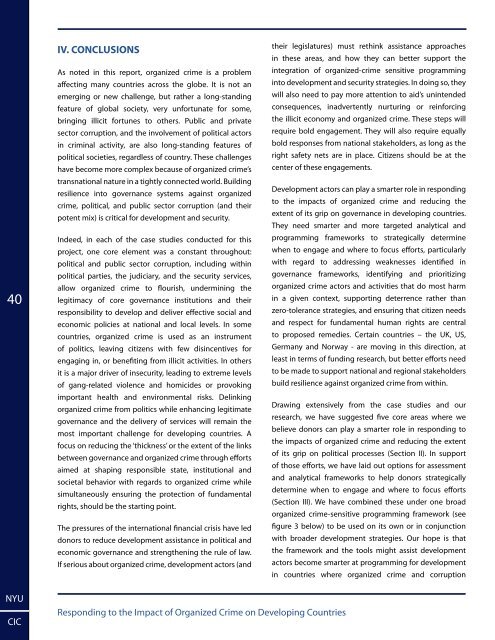here - Center on International Cooperation - New York University
here - Center on International Cooperation - New York University
here - Center on International Cooperation - New York University
You also want an ePaper? Increase the reach of your titles
YUMPU automatically turns print PDFs into web optimized ePapers that Google loves.
40<br />
IV. CONCLUSIONS<br />
As noted in this report, organized crime is a problem<br />
affecting many countries across the globe. It is not an<br />
emerging or new challenge, but rather a l<strong>on</strong>g-standing<br />
feature of global society, very unfortunate for some,<br />
bringing illicit fortunes to others. Public and private<br />
sector corrupti<strong>on</strong>, and the involvement of political actors<br />
in criminal activity, are also l<strong>on</strong>g-standing features of<br />
political societies, regardless of country. These challenges<br />
have become more complex because of organized crime’s<br />
transnati<strong>on</strong>al nature in a tightly c<strong>on</strong>nected world. Building<br />
resilience into governance systems against organized<br />
crime, political, and public sector corrupti<strong>on</strong> (and their<br />
potent mix) is critical for development and security.<br />
Indeed, in each of the case studies c<strong>on</strong>ducted for this<br />
project, <strong>on</strong>e core element was a c<strong>on</strong>stant throughout:<br />
political and public sector corrupti<strong>on</strong>, including within<br />
political parties, the judiciary, and the security services,<br />
allow organized crime to flourish, undermining the<br />
legitimacy of core governance instituti<strong>on</strong>s and their<br />
resp<strong>on</strong>sibility to develop and deliver effective social and<br />
ec<strong>on</strong>omic policies at nati<strong>on</strong>al and local levels. In some<br />
countries, organized crime is used as an instrument<br />
of politics, leaving citizens with few disincentives for<br />
engaging in, or benefiting from illicit activities. In others<br />
it is a major driver of insecurity, leading to extreme levels<br />
of gang-related violence and homicides or provoking<br />
important health and envir<strong>on</strong>mental risks. Delinking<br />
organized crime from politics while enhancing legitimate<br />
governance and the delivery of services will remain the<br />
most important challenge for developing countries. A<br />
focus <strong>on</strong> reducing the ‘thickness’ or the extent of the links<br />
between governance and organized crime through efforts<br />
aimed at shaping resp<strong>on</strong>sible state, instituti<strong>on</strong>al and<br />
societal behavior with regards to organized crime while<br />
simultaneously ensuring the protecti<strong>on</strong> of fundamental<br />
rights, should be the starting point.<br />
The pressures of the internati<strong>on</strong>al financial crisis have led<br />
d<strong>on</strong>ors to reduce development assistance in political and<br />
ec<strong>on</strong>omic governance and strengthening the rule of law.<br />
If serious about organized crime, development actors (and<br />
their legislatures) must rethink assistance approaches<br />
in these areas, and how they can better support the<br />
integrati<strong>on</strong> of organized-crime sensitive programming<br />
into development and security strategies. In doing so, they<br />
will also need to pay more attenti<strong>on</strong> to aid’s unintended<br />
c<strong>on</strong>sequences, inadvertently nurturing or reinforcing<br />
the illicit ec<strong>on</strong>omy and organized crime. These steps will<br />
require bold engagement. They will also require equally<br />
bold resp<strong>on</strong>ses from nati<strong>on</strong>al stakeholders, as l<strong>on</strong>g as the<br />
right safety nets are in place. Citizens should be at the<br />
center of these engagements.<br />
Development actors can play a smarter role in resp<strong>on</strong>ding<br />
to the impacts of organized crime and reducing the<br />
extent of its grip <strong>on</strong> governance in developing countries.<br />
They need smarter and more targeted analytical and<br />
programming frameworks to strategically determine<br />
when to engage and w<str<strong>on</strong>g>here</str<strong>on</strong>g> to focus efforts, particularly<br />
with regard to addressing weaknesses identified in<br />
governance frameworks, identifying and prioritizing<br />
organized crime actors and activities that do most harm<br />
in a given c<strong>on</strong>text, supporting deterrence rather than<br />
zero-tolerance strategies, and ensuring that citizen needs<br />
and respect for fundamental human rights are central<br />
to proposed remedies. Certain countries – the UK, US,<br />
Germany and Norway - are moving in this directi<strong>on</strong>, at<br />
least in terms of funding research, but better efforts need<br />
to be made to support nati<strong>on</strong>al and regi<strong>on</strong>al stakeholders<br />
build resilience against organized crime from within.<br />
Drawing extensively from the case studies and our<br />
research, we have suggested five core areas w<str<strong>on</strong>g>here</str<strong>on</strong>g> we<br />
believe d<strong>on</strong>ors can play a smarter role in resp<strong>on</strong>ding to<br />
the impacts of organized crime and reducing the extent<br />
of its grip <strong>on</strong> political processes (Secti<strong>on</strong> II). In support<br />
of those efforts, we have laid out opti<strong>on</strong>s for assessment<br />
and analytical frameworks to help d<strong>on</strong>ors strategically<br />
determine when to engage and w<str<strong>on</strong>g>here</str<strong>on</strong>g> to focus efforts<br />
(Secti<strong>on</strong> III). We have combined these under <strong>on</strong>e broad<br />
organized crime-sensitive programming framework (see<br />
figure 3 below) to be used <strong>on</strong> its own or in c<strong>on</strong>juncti<strong>on</strong><br />
with broader development strategies. Our hope is that<br />
the framework and the tools might assist development<br />
actors become smarter at programming for development<br />
in countries w<str<strong>on</strong>g>here</str<strong>on</strong>g> organized crime and corrupti<strong>on</strong><br />
NYU<br />
CIC<br />
Resp<strong>on</strong>ding to the Impact of Organized Crime <strong>on</strong> Developing Countries
















